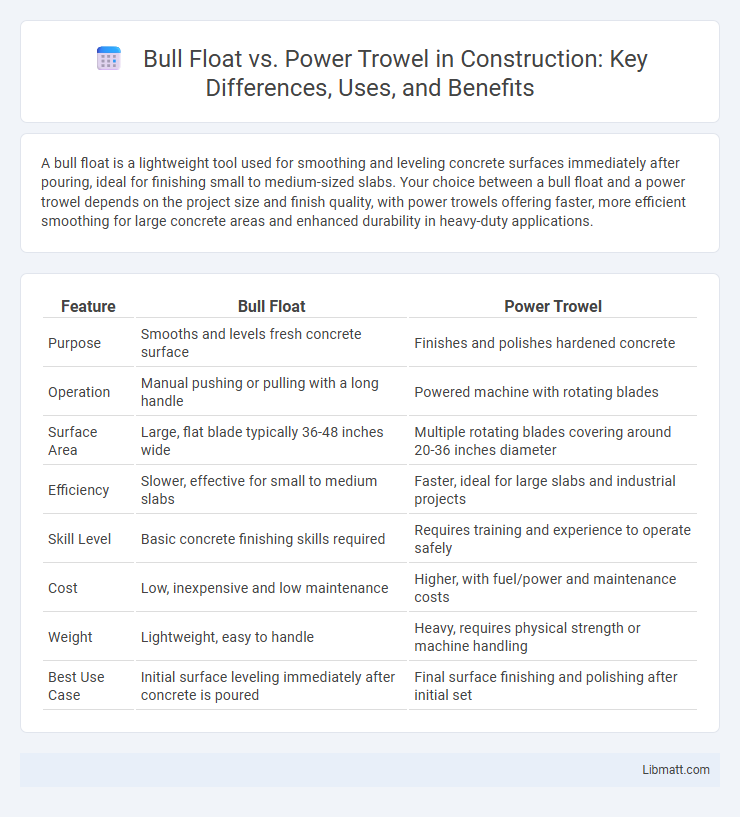A bull float is a lightweight tool used for smoothing and leveling concrete surfaces immediately after pouring, ideal for finishing small to medium-sized slabs. Your choice between a bull float and a power trowel depends on the project size and finish quality, with power trowels offering faster, more efficient smoothing for large concrete areas and enhanced durability in heavy-duty applications.
Table of Comparison
| Feature | Bull Float | Power Trowel |
|---|---|---|
| Purpose | Smooths and levels fresh concrete surface | Finishes and polishes hardened concrete |
| Operation | Manual pushing or pulling with a long handle | Powered machine with rotating blades |
| Surface Area | Large, flat blade typically 36-48 inches wide | Multiple rotating blades covering around 20-36 inches diameter |
| Efficiency | Slower, effective for small to medium slabs | Faster, ideal for large slabs and industrial projects |
| Skill Level | Basic concrete finishing skills required | Requires training and experience to operate safely |
| Cost | Low, inexpensive and low maintenance | Higher, with fuel/power and maintenance costs |
| Weight | Lightweight, easy to handle | Heavy, requires physical strength or machine handling |
| Best Use Case | Initial surface leveling immediately after concrete is poured | Final surface finishing and polishing after initial set |
Introduction to Concrete Finishing Tools
Bull floats and power trowels are essential concrete finishing tools used to achieve smooth, durable surfaces. A bull float is manually operated and ideal for leveling freshly poured concrete over large areas, while a power trowel, powered by gasoline or electric motors, offers faster, more precise finishing for bigger projects. You can enhance the quality and efficiency of your concrete finishing by selecting the right tool based on project size and surface requirements.
What is a Bull Float?
A bull float is a large, flat tool used in concrete finishing to smooth and level freshly poured concrete surfaces. Made typically from aluminum or magnesium and attached to a long handle, it helps eliminate surface imperfections and embed aggregate beneath the surface. Bull floats are essential in the initial stage of concrete finishing before more precise tools like power trowels are employed.
What is a Power Trowel?
A power trowel is a construction machine used to create a smooth, polished finish on concrete surfaces. It consists of rotating blades powered by a gasoline or electric engine, allowing for faster and more even finishing compared to manual tools. Power trowels are essential for large concrete slabs, providing efficiency and superior surface quality in commercial and industrial projects.
Key Differences Between Bull Float and Power Trowel
Bull floats and power trowels serve distinct roles in concrete finishing; bull floats are manually operated tools designed for smoothing fresh concrete surfaces immediately after pouring, while power trowels are motorized machines used for polishing and hardening the concrete once it begins to set. Key differences include the scale of operation, with bull floats suited for smaller areas and early-stage finishing, whereas power trowels efficiently handle large slabs and provide a high-quality, hardened finish. Selecting the right tool for your project depends on the concrete stage and surface area requiring treatment.
Bull Float: Main Features and Uses
Bull floats feature a long handle with a flat, wide blade designed for smoothing freshly poured concrete surfaces. They are essential for leveling and finishing large slabs to prevent surface imperfections and ensure even curing. Your concrete projects benefit from the bull float's ability to quickly smooth rough textures before hardening begins.
Power Trowel: Main Features and Applications
Power trowels are advanced concrete finishing machines designed to create smooth, flat surfaces on large slabs quickly and efficiently. Featuring rotating blades powered by gasoline or electric motors, they offer superior finishing speed and consistency compared to manual tools like bull floats. You can rely on power trowels for industrial or commercial projects requiring a polished, durable concrete surface with minimal labor.
Pros and Cons of Using a Bull Float
A bull float is essential for leveling and smoothing freshly poured concrete, offering ease of use and a lower cost compared to power trowels. It is lightweight and ideal for small to medium-sized projects, but it requires more physical effort and time to cover large areas. Your choice depends on the project scale and desired finish quality, as bull floats provide a good surface but lack the high-speed finishing capabilities of power trowels.
Pros and Cons of Using a Power Trowel
Power trowels significantly increase concrete finishing speed and provide a smoother, more uniform surface compared to traditional bull floats, making them ideal for large slabs. However, power trowels require skilled operators and higher initial investment, and they can be less effective in tight or small areas where precision is crucial. Maintenance costs and the potential for surface damage if used improperly are additional drawbacks to consider when selecting between a power trowel and a bull float.
Choosing the Right Tool for Your Concrete Project
Selecting between a bull float and a power trowel depends on the scale and finish requirements of your concrete project. Bull floats are ideal for small to medium slabs, providing initial smoothing by leveling the surface immediately after pouring. Power trowels, suited for large commercial jobs, deliver a polished, durable finish quickly by mechanically troweling the concrete surface.
Conclusion: Bull Float vs Power Trowel – Which is Better?
For concrete finishing, bull floats provide effective surface leveling for smaller or tight spaces, ensuring smoothness without damaging the slab. Power trowels excel in large-scale projects by offering faster, more uniform finishing and greater efficiency, boosting productivity on extensive slabs. Choosing between a bull float and a power trowel depends on project size, finish quality, and operational speed requirements.
Bull float vs Power trowel Infographic

 libmatt.com
libmatt.com